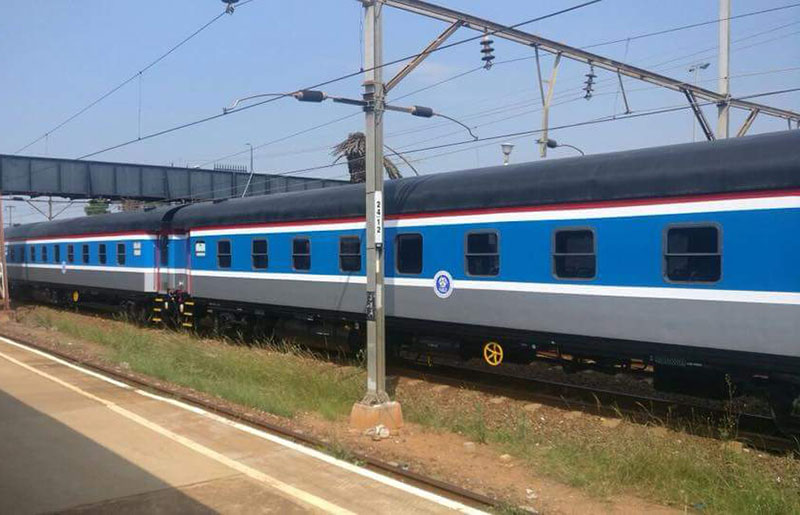NRZ seeks Govt bailout to boost capacity
THE National Railways of Zimbabwe (NRZ) says it is losing substantial business due to inadequate operational capacity and is appealing for a bailout from the Government to beef up its ailing fleet.
The parastatal is still using some old equipment that has overlived its lifespan, with a tired railway network system attracting high overhead costs that limit chances of profitability and competitiveness, according to management.
NRZ board chairman, Advocate Martin Dinha, yesterday said a total overhaul of the NRZ was necessary if the parastatal was to impact positively on the economy and contribute to the attainment of Vision 2030.
Years of inefficient business and weak corporate governance have in the last few years thrown the giant railway firm into its lowest business performance, evidenced by a drop in cargo volumes and loss of jobs from a peak of 14 000 to 4 700 workers currently.
Given its bulk transportation ability and lower costs compared to road and air transport, the rail remains strategic to the country’s economic turnaround efforts as a key enabler in the transport and logistics front.
“We want NRZ to be the best parastatal in the country and not be a drain of the economy. But we need support. Governments the world over play a critical in their railways and without any support there is no railways to talk about,” said Adv Dinha.
“We appeal passionately for Government support. We want 41 modern locomotives, 300 wagons and 300 modern coaches.
National Railways of Zimbabwe (NRZ) Chief Engineer Alfred Gunzo (third from right) explains the cost of servicing a locomotive engine to visiting commissioners from different commissions during a tour of the NRZ’s mechanical workshops in Bulawayo yesterday
“The NRZ story is sad in that we have the business but lack capacity. We don’t have the tools of the trade and so we lose business.”
The lifespan of a locomotive is 25 years and Zimbabwe last bought these in 1992. The board chair said NRZ must move with the times and embrace modern technology that will make it compete with regional and international peers.
This includes modernising the obsolete signal infrastructure and putting in air conditioning and information communication technology elements on the coaches to allow comfortable travel.
Adv Dinha said investing in increased NRZ capacity would trim overhead costs, widen business volumes and create more employment opportunities along the value chain.
He said the NRZ would not dictate how much the Government should inject but said their needs hover around US$2 billion, which ideally would not be a once off support. Instead, he said that a gradual support plan was feasible taking into account of other pressing national needs.
Adv Dinha was speaking after a tour of the company’s integrated mechanical engineering plant in Bulawayo by a delegation of independent commissioners who were led by the Permanent Secretary in the Office of the President and Cabinet (OPC) responsible for parastatals and procurement, Mr Willard Manungo.
These included representatives from the Gender Commission, Lands Commission, Human Rights Commission, Zimbabwe Anti-Corruption Commission, National Peace and Reconciliation Commission, Media Commission, Insurance and Pensions Commission and the Corporate Governance Unit in the OPC.
In his remarks, Mr Manungo said the dream to achieve an upper middle-income economic status by 2030 requires discipline and contribution by all sectors. He reiterated the need to assist NRZ as a key enabler to economic growth through provision of competitive transport costs.
“We need to facilitate in having a competitive railway. We can’t talk of competitiveness without NRZ, it is the only way to lower cargo movement costs and the challenge in mass public transportation,” he said.
During the tour, the visiting delegation was shown different sections of the giant mechanical workshop, which has capacity to serve the entire region.
Though still functional, the bulk of the equipment in the workshops is old and needs to be upgraded. Due to its obsolete state, accessing spare parts for the machines, servicing and maintenance gobble thousands of dollars.
For instance, the delegation was told that it costs about US$1 million to repair one locomotive and US$3,7 million to buy a new one. It costs US$30 000 to repair a wagon once after 10 years and US$40 000 for a coach after every two years.
The delegation was briefed about the problem of delays and breakdowns during transportation due to disruption in operations while repairing old equipment.
Under the new dispensation led by President Mnangagwa, the NRZ is engaged in a comprehensive restructuring exercise aimed at enhancing business efficiency, which has seen several top executives being offloaded while efforts are also being intensified to weed out corrupt elements and bring culprits to book.-chronicle.co.zw











